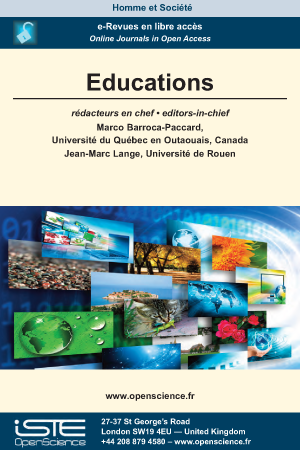

Social Sciences and Humanities > Home > Educations > Issue
Le numéro de la revue Educations a pour objectif d’aborder la question de l’éducation au développement durable dans un contexte international qui interroge le devenir de notre planète et de l’humanité (Dupuy,2004 ; Morin,2020). L’école se propose à plusieurs égards, de se saisir de cette thématique en premier lieu dans les curricula, à travers les " éducations à ", et en particulier celle relative au développement durable.
The Intergovernmental Panel on Climate Change (IPCC) is currently preparing its sixth assessment report, which will be published in 2022, but previous reports have highlighted the very significant impact of anthropogenic climate change on the entire planet in the 21st century. In this context, recent studies are conceptualizing climate change education. This article presents the first French synthesis of these works. It highlights the importance of teaching that integrates personal, action and knowledge dimensions, and it proposes possible guidelines for thinking about climate change education in a school context.
In what ways has education for sustainable development (ESD), as a new curricular context, influenced a school discipline, life and earth science (LES)? Our study is based on a diachronic analysis of the second year LES curricula from the 1990s to the present day (thematic, lexicometric analysis and analysis of didactic transposition times). The whole shows a regression of ecological knowledge in favour of the integration of hybrid knowledge linked to sustainable development (SD), a growing anthropocentrism and the opening of the discipline to social legitimacy. From this, we have drawn up guidelines for teacher training, in particular the importance of questioning the content of teaching, the relationship to knowledge, and of making the hidden curriculum explicit.
If education for sustainable development, introduced in French programs since 2004, seems necessary to consider the complexity of the environmental, social and economic challenges of the twenty-first century at school, the form which would consist in inculcating behaviors in younger generations is questionable. From an emancipatory perspective, work on complex, fuzzy problems linked to sustainable development seems an interesting voice for students to engage in critical reflection and build collective solutions. How, then, to work with this type of problem? Can we educate in complexity without taking charge of the problems for the students?
Climate change is a major societal concern. By taking it into consideration, the official instructions subject the school to a double challenge: to make the students understand scientifically the reasons for it and to engage them in the fight to stop it. Is it possible, and under what conditions, to reconcile these objectives? Our contribution studies these questions by focusing on the greenhouse effect, which is studied at different levels of education and regularly mobilized by the media. Based on a media support and on extracts from textbooks, we show on the one hand that what is proposed tends to get rid of scientific explanations in order to go as fast as possible to prescription and action; on the other hand, that the reasoned commitment of students for the climate necessarily passes by the development of critical ways of thinking and thus to their access to emancipating knowledge.
The epistemological foundations of ESD pedagogies: what Our communication is based on an inventory established in Redondo’s thesis (2018) from a survey of the practices of teachers in education for sustainable development (ESD). The didactic analysis highlights a significant gap between the pedagogical methods implemented and the theoretical supports at the origin of these pedagogies, which the training would make it possible to fill. Based on this analysis, we present a tool for positioning educational projects developed by a work-group of the Scientific Concil of National Education which could be a source for teaching practice.
The project Schools educating for sustainability: Proposals for and from in-service teacher education - TEDS - Teacher education for sustainability, 2019- 1-PT01-KA201-060830, an Erasmus + project, was born from the desire to contribute to teacher education programs for sustainability, aiming to ensure inclusive and quality education and to Goal 4 of the Sustainable Development Goals. This text presents the development of the TEDS project and its results, reflecting on key ideas of education for sustainability in contexts of in-service teacher education in European contexts.
This article is anchored in the philosophy of education combined with an interdisciplinary reflection that emerged from profound concern and an ethical reflexivity applied to teaching in the context of modern environmental challenges. We begin by showing that the awareness of the stakes of environmental sustainability makes it more necessary than ever to distance ourselves from the conceptions of legitimizing teaching authority that have traditionally been used, including in industrial modernity (1). We then outline a possible reconstruction of authority to render teaching autonomy durable in the face of such challenges (2). This involves, the revision of the very conception that the education institution may have of its responsibility in the face of present and future sustainability issues (3).

2024
Volume 24- 8
Issue 12023
Volume 23- 7
Issue 12022
Volume 22- 6
Issue 12021
Volume 21- 5
Issue 12020
Volume 20- 4
Special issue2019
Volume 19- 3
Issue 12018
Volume 18- 2
Issue 12017
Volume 17- 1
Issue 1